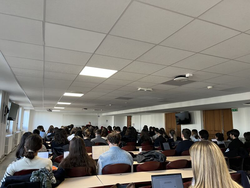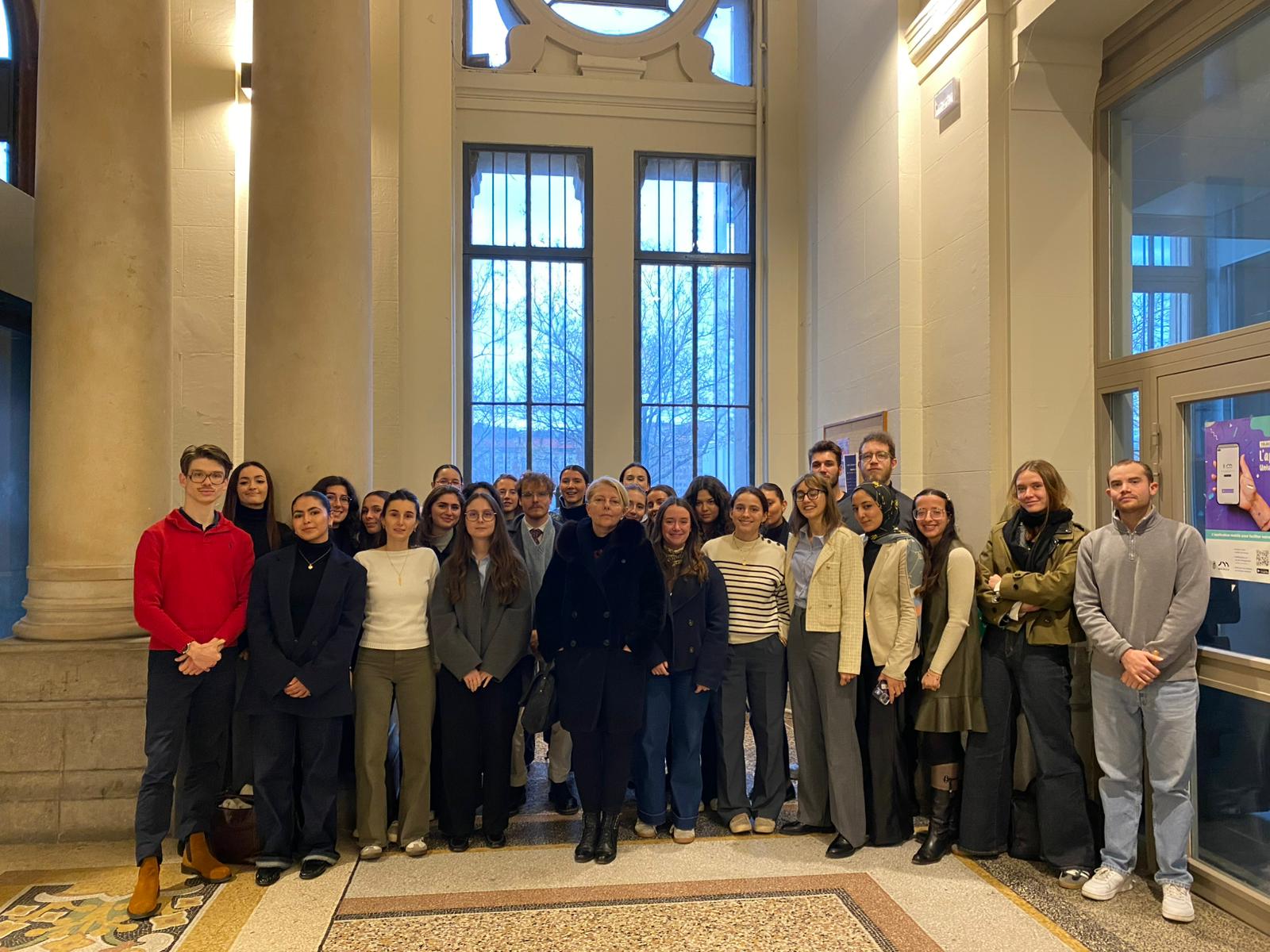Food for thoughts
Feb. 23, 2026
Conferences

🌐Follow Marie-Anne Frison-Roche on LinkedIn
🌐Subscribe to the Newsletter MAFR Regulation, Compliance, Law
🌐Subscribe to the video newsletter MAFR Overhang
🌐Subscribe to the Newsletter MaFR Law & Art
____
► Full reference : M.-A. Frison-Roche, "The Future of Compliance", series Compliance, Centre Perelman, Brussels, 23 February 2026.
____
🧮view the full programme for the series Compliance (in French)
____
► English presentation of this concluding conference in the series Compliance : The future of Compliance: who knows what it holds? Anyone who practises and studies the texts, litigation, structures and behaviours will have to admit that they do not know what will become of what has emerged as a new branch of law. It is not easily recognised, probably for three reasons. Firstly, because the birth of a new branch of law is an unusual phenomenon, whose disruptive and regenerative waves are felt in all branches of law and other regulatory systems, accompanying and reflecting the new world we have already entered, whether we like it or not. Secondly, because it is unpleasant (especially if you are a professor...) to begin and conclude with the fact that you do not know. Thirdly, because it is not very marketable, and in today's large and growing "compliance market", it is not very smart, if you want to sell compliance products (whether they be algorithms, new services to be linked to the highest level of companies, specialities in law firms, new chairs in various schools), to say that you don't know. So the experts say they know. For my part, I meet many people who are "experts" and who are "knowledgeable". What is surprising is the diversity of their discourse, which casts doubt on the solidity of the projection, particularly on the meaning of words: for example, not only words that could be described as "new" (which we then try to anchor in old words) such as "compliance/conformity" and "governance", but also words that we are undoubtedly more familiar with, such as "commitment" and "responsibility" or "sanction", i.e. the very pillars of the matter.
Why is this a cause for concern, apart from the fact that it is always better to know what we are talking about, rather than everyone talking in their own corner, for their own compliance corpus, for their like-minded friends, with the subject matter becoming increasingly siloed? Because the object of Compliance Law is the future. So, the future of this branch of law which its object is the future is by nature very uncertain.
It will therefore be assumed in advance that not knowing the future is a major difficulty when it comes to Compliance Law, in that this branch of law is unified in that it is ex ante and its object is the future. The difficulty is neither of the same nature nor of the same magnitude when it comes to the legislator, the "regulator", the regulated company (calculating or political), or the judge faced with systemic compliance litigation.
That said, in a first part, one can imagine the future possibilities for Compliance (because that is what it boils down to, given the number of candidates eager to seize the instruments of power that are the " Compliance tools"). It is not a foregone conclusion that this future will be governed by Law. The consequences could take care of that. Or the order given by the leader (Trump, for instance), and that would go down all the better as he states that he certainly does not care about human beings but that he wields the power of Compliance to restore the climate balance (through Chinese regulations): except to say that there is no unified Compliance Law. That there would be one for the climate and another for human rights. So what about the future consistency of European Law, which links the two in the CSRD and the CS3D? Particularly in value chains. The question then is: what will be the uniqueness of Compliance Law in the future?
____
In a second part, since we do not know how things will turn out, from omnibus to omnibus, from a government hostile to the Law to a government appealing to the Due Process, from case law to case law, from special law to common law, we must weigh up the advantages and disadvantages of the various perspectives. There is never one perspective where everything is good and another where everything is bad, because in that case there would be no choice and no policy: it would be enough to have information, to be "rational" and to go for the right solution rather than the wrong one. Beyond general statements that a combination of compliance and ethics is welcome, which is not in doubt in the superb statements made in this regard, it is necessary to look at the advantages and disadvantages of the direction we may take. Firstly, there is the disappearance of Compliance Law, with the advantage of reducing the regulatory burden on those subject to it and the disadvantage of abandoning altruistic and global ambitions (these two Monumental Goals may overlap). Secundly, it could involve the creation of a global empire, with the advantage of a simplified American empire, whether extraterritorialised by the state or by companies and their governance or technology, with the advantage of a Western model and the disadvantage of the crushing of "mondialisation" by globalisation and the disappearance of the specific ambitions of States. Thirdly, it may be a contribution to a war between powers, particularly through the European DSA and the data war, with the advantage of European maturity in Compliance Law as an extension of Regulatory Law and the disadvantage that we could move from a war in the metaphorical sense (never use metaphors in Law) to a war. Quaterly, it could be a new rule of Law in which systemic companies participate in an alliance to achieve Monumental political Goals decided by States and political authorities, preserving systems for the future ("sustainability") so that human beings are not crushed by them but benefit from them. The disadvantage is that we have to relearn the Law, because although it has nothing to do with conformity, which is only an instrument, Compliance Law changes all branches of Law and requires the integration of other techniques, particularly political and technological ones.
____
In third part, in practice, we must strive in advance to reduce the disadvantages associated with the shortcomings of possible future developments in Compliance Law, just as we must strive in advance to increase the advantages associated with the qualities of possible future developments in Compliance Law. The disadvantage lies in the very nature of Compliance Law, namely its great power, because unlike Competition Law, it calls for and increases power. We must therefore counteract the prospect of compliance techniques, particularly those related to Information, being monopolised by those who only want to use them to consolidate or extend their power, laughing at Ethics and Monumental Goals. This means that supervision techniques on the one hand and a renewed role for judges on the other must be considered. The quality attached to possible futures stems from the fact that we could uphold a "Global Law" (reference to the work of Benoît Frydman, among others) and that, faced with the possible disappearance of Public International Law and the imperative preservation of value chains, particularly in the context of possible war, the alliance between supervised systemic companies and the political authorities in charge of the future of the social group that legitimises them may appear to be a legitimate, effective, efficiate and efficient system.
____
⛏️Go further :
🕴🏻M.-A. Frison-Roche, 📝Compliance Law, 2016
🕴🏻M.-A. Frison-Roche, 📝Conceiving Power, 2021
🕴🏻M.-A. Frison-Roche, 📕Compliance Monumental Goals, 2022
🕴🏻M.-A. Frison-Roche, 📝The Birth of a New Branch of Law: Compliance Law, 2024
🕴🏻M.-A. Frison-Roche, 📝Compliance Law and conformity: distinguishing between them to better articulate them, 2024
🕴🏻M.-A. Frison-Roche, 📕Complianceo Obligation, 2025
🕴🏻M.-A. Frison-Roche, 📝Compliance Law and Systemic Litigation, 2025
________
Feb. 10, 2026
Thesaurus : Doctrine
► Référence complète : H. Synvet, "Droit versus régulation", Bull. Joly Bourse, janv. fév. 2026, n°1, p.1.
____
🦉Cet article est accessible en texte intégral pour les personnes inscrites aux enseignements de la Professeure Marie-Anne Frison-Roche
Feb. 3, 2026
Questions of Law
Jan. 29, 2026
Conferences

🌐Follow Marie-Anne Frison-Roche on LinkedIn
🌐Subscribe to the Newsletter MAFR Regulation, Compliance, Law
🌐Subscribe to the video newsletter MAFR Overhang
🌐Subscribe to the Newsletter MaFR Law & Art
____
► Full reference : M.-A. Frison-Roche, "Le Droit de la Compliance, voie de la transition vers une égalité effective, efficace et efficiente entre les êtres humains (Compliance Law, for the transition towards the effectiveness, efficacy and efficiency of the equality between human beings)", in Chair "Mutualist and cooperative banking at the service of the economy", ESCP, Les banques coopératives et les transitions (Cooperative Banks and Transitions), 29 January 2026.
____
🧮view the general programme for the conference Cooperative banks and transitions (in French)
____
📶see the slides (in French)
____
► Presentation of this conference: The conference is not specifically aimed at lawyers, and even less so at specialists in Compliance Law. That is why it is divided into three parts, in order to show how Compliance Law is relevant in practice for creating effective, efficace and efficient equality between human beings.
The first part of the lecture sets out the ambition of equality between human beings. As this is a political principle and not a natural one. As it is an ambition, it justifies being placed first and after that this ambition must be concretised, in a sort of second place. This second place is built bay a tro : that of effectiveness (real application of the norm), efficacy (that the goal for which the norm was established is achieved) and efficiency (that the system is transformed so that, having become robust, it endures through sustainabily).
The second part of the conference will present the new branch of law known as Compliance Law. This should be distinguished from simple conformity, which consists of mechanically obeying a body of regulations that are constantly growing and becoming more complex. Compliance Law's Goal is to protect systems from risks that could cause them to disappear (all systems). "Sustainability" is the key principle, which is not limited to the climatic system (also digital system, banking system, and so on) and imposes the future as its object and the long term as its relevant time frame (unlike the market and Competition Law). "Transition" is also a key concept, as it involves moving from one state to another, from an expressed ambition to its realisation, through collaboration with others. These Goals are "Monumental" and are the normative legal basis of Compliance Law. In Europe, the Compliance Monumental Goal is to preserve systems for that the human beings who are involved in them, willingly or unwillingly, are not crushed by them, but rather benefit from them (for instance in banking sector). This is a "Monumental Negative Goal", to which is added a "Monumental Positive Goal", which a new conception of the "Ex Ante Responsability" (not liabily).
Dialectically, the third part of the conference explains how Compliance Law internalises the political ambition of equality between human beings, which develops in the three concentric circles of effectiveness, efficacy and efficiency, among the operators best placed to contribute to it.
Mutual banks belong to these circles more than the others. Firstly, because they are structured around the principle of taking human beings into consideration. Secondly, because they are rooted in their local areas. Thirdly, because they are driven by the long term, duration and sustainable. The transition est easer. The dificulty is the necessity to proof the effective and efficient will to do this transition.
____
⛏️Go further :
🕴🏻M.-A. Frison-Roche, 📝Drawing the circles of Compliance Law, 2017
🕴🏻M.-A. Frison-Roche, 📝Monumental goals, the beating heart of compliance law, 2021
🕴🏻C. Peicuti and 🕴🏻J. Beyssade, 📝The feminisation of management positions in companies as a compliance objective. The example of the banking sector, in 🕴🏻M. -A. Frison-Roche, 📘The Monumental Goals of Compliance, 2022
🕴🏻M.-A. Frison-Roche, 📝Births of a New Branch of Law: Compliance Law, 2024
________
Jan. 27, 2026
Questions of Law
Jan. 25, 2026
Questions of Law
Jan. 22, 2026
Thesaurus : Doctrine
► Référence complète : E. Pataut et S. Robin-Olivier, Les directives CSRD et CS3D et le droit social. Respecter les droits sociaux dans les chaînes de production mondiales, Bruylant, coll. "Droit de l'Union européenne" (Colloques), 2026
____
►lire la table des matières et l'avant-propos
________
Jan. 22, 2026
Newsletter MAFR - Law, Compliance, Regulation

🌐Follow Marie-Anne Frison-Roche on LinkedIn
🌐Subscribe to the Newsletter MAFR Regulation, Compliance, Law
🌐Subscribe to the video newsletter MAFR Overhang
🌐Subscribe to the Newsletter MaFR Law & Art
____
► Full reference: M.-A. Frison-Roche, "Asset freezing in the legal saga between American power and Venezuelan wealth", MAFR Law, Compliance, Regulation Newsletter, 23 January 2026
____
🌐read this article published on LinkedIn the 23 January 2026
____
📧Read other articles from the MAFR Newsletter - Law, Compliance, Regulation for free with a subscription.
____
► Summary of this article : It is often emphasised that the law is merely a masquerade in the series of events we are witnessing.
This is not entirely true.
For three reasons.
1. Much will depend on the judge who will rule on the Madura couple's case. The energy sector has always similarly mixed regulation, public policies of states and businesses, both articulated by States and companies, both articulated by international contracts, always organising international arbitration
3. If ExxonMobil now refuses to make the investments desired by Trump, it is also because this enterprise remembers that many years ago the freeze of assets granted by the arbitrators was not very successful, and now the company manager believes that investment in Venezuala's infrastructure is therefore "impossible".
And given the current state of the law in the US, there is little Trump can do about it..
____
📝⤵Read the complete article below⤵
Jan. 9, 2026
Thesaurus : Doctrine
► Référence complète : Y. Kerbrat et S. Maljean-Dubois, "Legal consequences of breaching international climate obligations in the ICJ Advisory Opinion on climate change", Review of European, Comparative & International Environmental Law (RECIEL), opinion, janvier 2026.
____
🦉Cet article est accessible en texte intégral pour les personnes qui suivent les enseignements de la professeure Marie-Anne Frison-Roche.
_________
Jan. 8, 2026
Interviews

🌐suivre Marie-Anne Frison-Roche sur LinkedIn
🌐s'abonner à la Newsletter MAFR Regulation, Compliance, Law
🌐s'abonner à la Newsletter en vidéo MAFR Surplomb
🌐s'abonner à la Newsletter MaFR Droit & Art
____
► Référence complète : M.-A. Frison-Roche, «"Géomètres-experts : une profession qui s’engage dans la compliance"», interview pour Solution Notaire Hebdo, Lefebvre Dalloz, 8 janvier 2026
Interrogée par Juliette Courquin, journaliste à Solution Notaire Hebdo
___
► lire l'entretien : 💬 Lire l'interview au cours duquel les réponses ont été apportées aux questions reproduites ci-dessous⤵
____
Q. Pourriez-vous définir le droit de la compliance ?
Q. La compliance se prête-t-il à l'Ordre des géomètres-experts et à la profession elle-même ?
Q. L'OGE et la profession se sont engagés dans la compliance en définissant leur raison d'être, quelles en sont les conséquences juridiques ?
Q. Un dernier mot sur l'Ordre des géomètres-experts et la profession avec qui vous avez travaillé sur la compliance ?
_________
⛏️Aller plus loin sur la question :
🕴🏻M.-A. Frison-Roche, 🎤Concevoir une raison d'être et l'expliciter, 2025
🕴🏻M.-A. Frison-Roche, 📝Les buts monumentaux de la compliance, coeur battant du droit de la compliance, 2023
________
Dec. 10, 2025
Conferences

🌐Follow Marie-Anne Frison-Roche on LinkedIn
🌐Subscribe to the Newsletter MAFR Regulation, Compliance, Law
🌐Subscribe to the video newsletter MAFR Overhang
🌐Subscribe to the Newsletter MaFR Law & Art
____
► Full reference : M.-A. Frison-Roche, Saisir les principes du Droit de la Compliance à travers l'actualité (Understanding the principles of compliance law through current current legal cases and events), Jean Moulin - Lyon 3 University Law Faculty, 10 December 2025.
____
► Methodological presentation of this 4-hour MasterClass : It is difficult to teach a branch of law that is still being developed, to find a way to open its doors, because if by explaining its principles ex abrupto, the risk exists of remaining at the door, even though the aim is to open it. This door is all the more blocked by the accumulation of multiple regulatory corpus, which are now perceived as being linked to Compliance Law: GDPR, Sapin 2, Vigilance, Nis2, Dora, FCPA, etc.; These are highly technical and complicated, and tend to be studied in silos, with little connection between them and little articulation with the traditional branches of Law. Therefore, the principles that form the backbone of Compliance Law as an autonomous branch of Law are all the less apparent, even though they would make these "compliance blocks" more intelligible and manageable. However, setting out these principles, which shed light not only on the current positive law but also on how it will evolve, seems "theoretical".
In order to open the door to this new branch of Law, which already occupies a significant place in practice and is set to expand, so that it can be handled by lawyers who understand its spirit and is not entirely dominated by those from other disciplines who will master its tools (risk mapping, assessment, internal investigation, etc.), most often through algorithms and platforms (compliance by design), it is relevant to start with a few cases, a few decisions, a few texts, and a few comments, to gauge what they reveal.
Because the principles are already there. They are gradually emerging. The challenge is that they often emerge quickly, in a manner that is sufficiently consistent with other branches of Law, and that the legal aspect takes precedence. That is what is at stake today.
Each hour is devoted to a different case, based on a document of a different legal genre.
____
🌐read a post on LinkedIn (in French)
____

____
⛏️Find out more :
🕴🏻M.-A. Frison-Roche, 📝Compliance Law, 2016
🕴🏻M.-A. Frison-Roche, 📝Monumental Goals, the beating heart of Compliance Law, 2023
🕴🏻M.-A. Frison-Roche, 📝In Compliance Law, the legal consequences for Entreprises of their commitments and undertakings, 2025
🕴🏻M.-A. Frison-Roche, 📝Compliance Law and Systemic Litigation, 2025
________
Nov. 28, 2025
Thesaurus : Doctrine
► Référence complète : K.Lenaerts, "Democracy in the EU: A Value Beyond the Ballot Box", King’s College London - Centre Of European Law – 51st Annual Lecture – 28 novembre 2025.
____
►lire la transcription de cette conférence
________
Nov. 27, 2025
Interviews

🌐Follow Marie-Anne Frison-Roche on LinkedIn
🌐Subscribe to the Newsletter MAFR Regulation, Compliance, Law
🌐Subscribe to the video newsletter MAFR Overhang
🌐Subscribe to the Newsletter MaFR Law & Art
____
► Full reference : M.-A. Frison-Roche, ""Géomètres-experts : une profession qui assume concrètement sa responsabilité territoriale Géomètres-experts : une profession qui assume concrètement sa responsabilité territoriale (Chartered Surveyors: a Profession that takes its territorial responsibility seriously)", interview for JurisHebdo, 27 November 2025
___
► Read the interview (in French) in which the questions (translated below in English) were answered⤵
____
Q.You helped define the raison d'être of the profession of chartered surveyors and its Professional Order. In your opinion, what is its true consequences?
Q. Can the raison d'être become a tool for Compliance or Governance?
Q. What conflicts arise around the source of compliance norms and their implementation?
Q. Is this initiative part of a broader move towards social responsibility?
Q. How can the raison d'être influence the mission of the chartered surveyor, particularly in relation to land and environmental matters?
_________
⛏️Further reading on the subject:
🕴🏻M.-A. Frison-Roche, 🎤Designing a raison d'être and explaining it, 2025
🕴🏻M.-A. Frison-Roche, 📝The Monumental Goals of Compliance, the beating heart of Compliance Law, 2023
________
Nov. 26, 2025
Thesaurus : Doctrine
► Référence complète : Y. Kerbrat, "L’avis consultatif de la Cour internationale de justice du 23 juillet 2025 sur les obligations des États en matière de changement climatique", Clunet, 2025, n°4,
________
🦉Cet article est accessible en texte intégral pour les personnes inscrites aux enseignements de la Professeure Marie-Anne Frison-Roche.
Nov. 26, 2025
Thesaurus : Doctrine
► Référence complète : V. Monteillet, "Le contrat, outil de mise en oeuvre des obligations de vigilance entre partenaires de la chaine de valeur", in M. Boutonnet, B. Parance et J. Rochfeld (dir.), Engagements et contrats à l'aune des mutations environnementales, Lefebvre-Dalloz, coll. "Thèmes et commentaires, 2025, pp.15-24.
_____
🦉Cet article est accessible en texte intégral pour les personnes inscrites aux enseignements de la Professeure Marie-Anne Frison-Roche
________
Nov. 20, 2025
Thesaurus : Doctrine
► Référence complète : S. Couture et G. Latzko, Internet(s) alternatif(s) , Dossier spécial, Revue Réseaux, 2025/6 N° 254, La Découverte, 320 p.
____
► Présentation du dossier (par les directeurs de celui-ci) :Le concept d’Internet alternatif fait référence, au sens le plus large, à des innovations sociotechniques portées par des acteurs qui contestent les modèles industriels et commerciaux dominants qui structurent l’écosystème contemporain des médias et infrastructures numériques. Ce dossier examine différentes facettes et manifestations concrètes de ce désir d’alternatives numériques. Les textes qu’il réunit analysent une variété d’initiatives et interrogent leur rôle, leurs valeurs parfois contradictoires et leur positionnement par rapport aux dispositifs et plateformes de l’Internet dominant.
En ouverture du dossier, l’article de présentation tente de définir ce qui est « alternatif » dans l’Internet alternatif, puis passe en revue les enjeux et défis qui en découlent.
Les deux contributions suivantes s’intéressent aux architectures fédérées, la première abordant le développement des protocoles et plateformes du Fédivers, tels ActivityPub et Mastodon, tandis que la seconde se penche sur leur adoption (dans le cas de Matrix/Element) par les pouvoirs publics à des fins de souveraineté numérique. Viennent ensuite une étude consacrée aux communs numériques de Wikimédia et à leurs relations avec les plateformes de l’Internet dominant (notamment Google), puis une enquête sur les marchés noirs numériques qui s’appuient sur le Darknet.
L’article suivant propose un panorama du champ émergent des études sur les « médias sociaux alternatifs » avec comme objectif de parvenir à définir cet objet d’étude. Enfin, le dossier se clôt par un compte-rendu d’expérience de l’adoption d’une plateforme alternative de diffusion vidéo (PeerTube) dans les milieux de l’éducation supérieure.
____
Nov. 13, 2025
Interviews

🌐Follow Marie-Anne Frison-Roche on LinkedIn
🌐Subscribe to the Newsletter MAFR Regulation, Compliance, Law
🌐Subscribe to the video newsletter MAFR Overhang
🌐Subscribe to the Newsletter MaFR Law & Art
____
► Full reference : M.-A. Frison-Roche, ""Ordonner la Compliance : pourquoi le faire et comment le faire ? (Organising Compliance: why do it and how to do it?)", interview Focus on... conducted for Dalloz Actu Étudiants, 13 November 2025
___
► read the interview : 💬 Read the interview (in French)
____
🌐read the interview presentation on LinkedIn (in French)
🌐read the interview presentation through the MAFR Newsletter Law, Compliance, Regulation, (in English)
____
► presentation of the interview by Dalloz Actu-Étudiants : Compliance can be defined as a new branch of law that mobilises major economic players and their stakeholders to ensure that the large systems in which we live do not collapse, but remain solid and sustainable. Sanctions, contracts, ethical principles, court decisions and corporate cultures all converge to achieve this. The ambition is great, some contest it, many want to escape it. It is still difficult to define compliance, which seems to be going in all directions. Who? What? Why? How?
These are all questions addressed by Marie-Anne Frison-Roche, professor of law and editor-in-chief of the Journal of Regulation & Compliance (JoRC), together with the contributors to the collective works in the Régulations & Compliance series under her scientific direction. Compliance (JoRC), together with the contributors to the collective works in the "Regulations & Compliance" collection under her scientific direction, sheds light on with her imaginative power combined with her legal precision.
____
Q.Why do the fundamental objectives of compliance unify all legal compliance techniques?
Summary of MAFR's response: because all these regulatory frameworks, which large companies are required to enforce effectively and which appear disparate, creating as many specific requirements as there are regulatory compliance blocks, find their unity when we consider the following reality: whatever the body of regulations in question (Sapin 2, Vigilance, Nis2, Dora, IAA, etc.), the aim is always to identify and prevent systemic risks so that these systems do not collapse.
Q. How can we define the obligation of compliance?
Summary of MAFR response: the company concerned is therefore obliged to put in place "compliance structures", such as mapping, plans, alert structures and programmes (obligation of result), but of course, and this is the key point, to achieve this goal, namely to ensure that the system in question (banking, financial, climate, digital, algorithmic, etc.) does not collapse. This is an obligation of means. This is the exact, simple definition that unifies all the regulations of the Compliance Obligation for which subject companies are responsible.
Q. What conflicts arise around the source of compliance standards and their implementation?
Summary of MAFR's response: It must remain a matter of law. However, many argue that because it is only a matter of "compliance" and "ticking all the boxes", algorithms (which do not think or know anything) will do this, eliminating the need for lawyers and the law. This must be avoided. Furthermore, given the immense ambition of safeguarding systems, political and public authorities, businesses and stakeholders must join forces. They must not fight to bring each other down.
Q. What are the complexities of compliance law?
Summary of MAFR's response: I would not say "complexity", because although the regulations are complicated, compliance law is fairly simple and unified around its monumental goals of safeguarding systems, ensuring their future sustainability and protecting the people involved in them. However, it is a new branch of law that is still poorly understood and therefore sometimes poorly mastered. It therefore needs to be organised.
Q. What is your proposal for ordering it?
Summary of MAFR's response: Teaching more about compliance law will facilitate its organisation. The courts, to which all regulations converge through litigation, will participate in this organisation, which is necessary to ensure that regulations do not remain in silos and do not contradict each other when they have the same purpose, which constitutes their legal normativity. This new branch of law must also be articulated with all other branches of law. This is notably what the recently published book, L'obligation de compliance (The Obligation of Compliance), does.
_________
Nov. 6, 2025
Conferences

🌐Subscribe to the Newsletter MAFR Regulation, Compliance, Law
🌐Subscribe to the video newsletter MAFR Overhang
🌐Subscribe to the Newsletter MaFR Law & Art
____
► Full reference : M.-A. Frison-Roche, "Concevoir une Raison d'être et l'explicitre (Conceiving a Raison d'être and explaining it)", speech at the round table discussion "Dire sa Raison d'être (Expressing your Raison d'être)", National Conference of the Géomètres Expert (French Chartered Surveyors), 6 November 2025, Paris.
____
► Presentation of the Round Table : This round table opens two days of work bringing together all the leaders, members of the Council of the Order of Chartered Surveyors and Regional Councils of Chartered Surveyors, in the presence of the relevant Ministry, in specific sessions during which the two Raison d'être that have been developed over several years of work and adopted, the Raison d'être of the profession and the Raison d'être of the Order, are presented.
🪑🪑🪑Other participants in the round table discussion, moderated by Hervé Grélard, General Deputy of the French Order of Chartered Surveyors:
🕴🏻Thomas Bonnel, chartered surveyor
🕴🏻Luc Lanoy, chartered surveyor,
🕴🏻Séverine Vernet, Chairwoman of the French Order of Chartered Surveyors
____
► Summary of my presentation : Firstly, I spoke to remind everyone what a "raison d'être" is, in itself, and why it is particularly important when the entity that embodies it also constitutes a "profession", the raison d'être expressing this hybrid nature that is destined to endure in today's societies. It moves those who uphold the raison d'être – the professional, the profession, the umbrella organisation that is the Order – from the past to the future. To effectively carry this raison d'être, its bearer cannot remain isolated. Unlike the agent who operates in a market and whose strategy is solitary dynamism against others, the bearer of the raison d'être must find allies who share similar or compatible ideas and develop points of contact to carry out a collective project (the "Monumental Goals"). This is why it is just as important to communicate, explain and share the raison d'être with the outside world.
Secondly, as the discussion surrounding the statement of purpose of the French Order of Surveyors and the profession progressed, I was led to point out that the raison d'être is not, or not only, ethical in nature, but also legal in nature, constituting at the very least a legal fact that can become enforceable against those who recognise themselves in it and claim it. This kind of reward, which is the "ex ante responsibility" expressed by the raison d'être and relayed by Compliance Law, anchored in its monumental goals of sustainability and responsibility, justifies that the profession that embraces its raison d'être is not simply an efficient profession in a supply and demand market, but establishes the Order as a regulator. This places both in the long term.
________
⛏️Further reading on the subject: (with English Summaries)
🕴🏻M.-A. Frison-Roche, 💬"Géomètres-experts : une profession qui assume concrètement sa responsabilité territoriale", 2025
🕴🏻M.-A. Frison-Roche, 📝A quoi engagent les engagements, 2025
🕴🏻M.-A. Frison-Roche et 🕴🏻S. Vernet, 📝La profession investit le Droit de la compliance et détermine sa Raison d'être, 2023
🕴🏻M.-A. Frison-Roche, 📧Quels sont les points de contact entre la Raison d'être des entreprises et le Droit de la Compliance ?, 2022
________
Nov. 4, 2025
Thesaurus : Doctrine
► Référence complète : Ph. Aghion, "L’adversité comme facteur d'innovation", leçon dans le cours Innovation et croissance à travers l'histoire, Collège de France, 4 novembre 2025.
____
► consulter les slides support de la leçon
La première partie de la leçon est sur le rapport même entre l'innovation et l'adversité.
Dans ce rapport, l'innovation arrive pour échapper à la concurrence ou échapper à la réglementation (par exemple le seuil de 50 salariés entraîne des innovations qui visent à aller beaucoup loin que 50 salariés.
Cela peut entraîner un changement technique "biaisé", c'est-à-dire le diriger vers une "innovation verte", c'est-à-dire en y intégrant la réglementation.
Ainsi l'adversité conduit à "diriger" davantage l'innovation, alors que l'innovation sans adversité ne vise qu'à l'intensité.
L'innovation va aussi réagir à des pénuries.
Par exemple une pénurie de main d'oeuvre, au sortir de la Première Guerre Mondiale, notamment dans le secteur agricole, l'analyse étant menée département par département. La pénurie qui est "causée" (causalité mesurée) par la guerre provoque la création des machines agricoles et cause une augmentation de dépôts de brevets (2 brevets en plus sur 100.000 habitants,, voire 3 brevets si le département a été plus touché).
On observe que l'innovation va porter sur la dispense de travail. Analysant le contenu des brevets, leurs mots, ils distinguent les brevets qui économisent du travail et ceux qui ne l'économisent pas particulièrement. La première catégorie a beaucoup plus augmenté que la seconde.
On observe aussi qu'il faut qu'il y ait sur place des personnes aptes à innover et qui travaillent ensemble (masse critique, ancrage local, chaine), le "capital humain" étant mesuré par l'étude exposée par l'orateur, le cumul des causalités amenant à une moyenne de 6 brevets.
Ainsi, même si la guerre a tué des innovateurs, l'effet d'innovation est tout de même plus fort.
La seconde partie de la leçon porte sur le "décollage" économique produit.
La question posée est de savoir si la pénurie a joué un rôle dans les décollages économiques liées aux révolutions industrielles.
L'hypothèse est le décollage serait plus prononcée quand il y a pénurie, l'adoption des technologies et l'exploitation des technologies étant plus forte lorsqu'il y a pénurie de travailleurs en raison de guerre. L'étude porte sur les guerres révolutionnaires et les guerres napoléonniennes.
Menée sur l'Angleterre, la causalité est dégagée à propos du critère de la haute mer car le capital humain étant captée par l'armée, il y a perte supérieure de capital humain, pénurie, accroissement d'équipements mécaniques et industriels autour de la machine-batteuse et l'innovation dans l'amélioration de celle-ci : la pénurie due à la guerre napolénienne a contribué à la Révolution industrielle anglaise.
________
Nov. 4, 2025
Thesaurus : Doctrine
► Référence complète : E. Hache, V. d'Herbemont, L.-M. Malbec et C. Roche, "Transition énergétique : une rupture dans la dynamique de demande mondiale en métaux ?", in Ch. Poinsso (dir.), Les métaux stratégiques, nouveau défi de la transition énergétique et de la réindustrialisation, Annales des Mines, coll. "Réalités industrielles", nov. 2025.
____
📗lire la présentation du numéro
____
► Résumé de cet article (faite par les auteurs) : "Les métaux stratégiques, nouveau défi de la transition énergétique et de la réindustrialisation En 2024, les investissements dans les technologies bas-carbone (énergies renouvelables, nucléaire, réseaux, stockage, efficacité énergétique, carburants peu émissifs et véhicules électriques) ont atteint près de 2 100 milliards de dollars, soit une hausse de 11 % par rapport à 2023 (BNEF, 2025). Si ces investissements représentent aujourd’hui quasiment le double de ceux observés dans le secteur des hydrocarbures, un objectif de limitation de la hausse des températures à 1,5°C à l’horizon 2050 nécessiterait une multiplication par 2,5 de ce niveau d’investissement annuel. Ce rythme d’investissement, bien qu’insuffisant au regard des enjeux climatiques, a ravivé l’intérêt pour la sécurisation des ressources minérales, mobilisées en grandes quantités par la transition énergétique. Ces ressources minérales constituent en effet la base des technologies bas-carbone. Elles sont ainsi essentielles pour les moteurs et batteries des véhicules électrifiés (cobalt, cuivre, lithium, nickel, terres rares, graphite), pour les divers composants des parcs éoliens (aluminium, cuivre, graphite, manganèse, molybdène, nickel, etc.), pour les panneaux solaires (argent, cuivre, indium, silicium, etc.) et pour les technologies de l’hydrogène (nickel, palladium, platine). La majeure partie de ces substances étant des métaux, on parle par abus de langage de métaux même si le lithium ou d’autres n’en sont pas. Le niveau de déploiement requis pour ces technologies à l’horizon 2050 pourrait entraîner une forte hausse de la demande en métaux et transformer en profondeur les marchés concernés.".
________